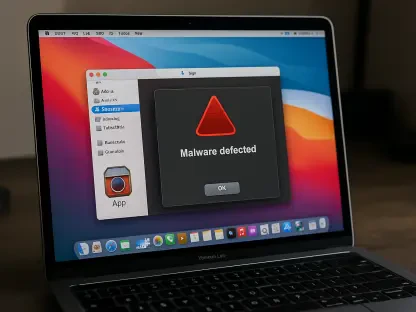Cybersecurity agencies across the globe have issued a critical advisory directed at users of Ubiquiti EdgeRouters after the MooBot botnet, attributed to the infamous APT28 group, was disrupted by law enforcement efforts. APT28, also known as Fancy Bear, is a Russian-associated cyber espionage group believed to operate under the auspices of the GRU. They have been engaging in a range of sophisticated cyber activities that span from malware deployment to credential theft and the exploitation of various network vulnerabilities. With a notorious history of cyber operations, APT28 has leveraged the ubiquity of Ubiquiti EdgeRouters since 2022, targeting sectors worldwide through the deployment of various cyber threats—ones that particularly thrive on devices configured with default or weak credentials.
The Intricacies of MooBot Infection
APT28’s intricate strategy saw these compromised routers as a launch pad for illicit cyber activities. The cyber operatives deployed Trojans, variants of malicious scripts, and a suite of other compromising tools to surreptitiously conduct their campaigns. One such deployment involved harvesting NTLMv2 digests, a technique that facilitates the acquisition of network authentication credentials. The routers were used not only as a means for proxying network traffic—keeping the threat actors’ operations obscured—but also as bases to execute spear-phishing attacks and maintain persistence within compromised networks using backdoors, such as MASEPIE. These routers essentially became unwitting facilitators of APT28’s cyber espionage activities, demonstrating the potent threat posed by compromised network hardware.In one of their more egregious campaigns, APT28 exploited a severe Microsoft Outlook vulnerability, CVE-2021-28482, leveraging it for privilege escalation and NTLM hash theft. This vulnerability, while now patched, allowed the group to conduct relay attacks that could subvert authentication mechanisms, placing entire networks at risk. The advanced nature of these operations showcased both the level of sophistication attributed to APT28 and the continuous evolution of their methods in adapting to the cybersecurity landscape.
Countermeasures and Protections
To combat the botnet threat, targeted organizations are advised to reset Ubiquiti EdgeRouters to factory settings, removing possible vulnerabilities. Updating router firmware to patch any security holes is a critical step. Moreover, stronger credentials should replace default or weak passwords to enhance security. Implementing stringent firewall rules is vital to prevent unauthorized network access and hinder cybercriminal movements.Such measures reflect a response to increasing concerns over network device vulnerabilities, as seen in incidents involving VPNFilter and Cyclops Blink. The advisory, along with APT29’s cloud attacks—attributed to Russia’s SVR—highlights the escalating cyber threat landscape. As state-sponsored cyber threats grow more sophisticated, ongoing adaptation of defensive strategies is imperative to protect critical network infrastructures.









